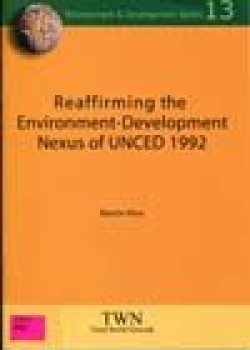
Reaffirming the Environment-Development Nexus of UNCED 1992
Author : Khor M.
Publisher: Third World Network
Place of Publish: Malaysia, Penang
Year: 2012
Page Numbers: 33
Series: Environment & Development Series 13
Acc. No: 4626
Class No: 333.7 KHO
Category: Books & Reports
Subjects: Environment and Natural Resources
Type of Resource: Monograph
Languages: English
ISBN: 978-967-5412-63-9
This paper presents an overview of the links between environment and development, and between North and South countries, in the context of the United Nations Conference on Environment and Development (UNCED) and its preparatory process. The 1992 UNCED ended with mixed feelings of euphoria, deep disappointment, concern about the future, and stirrings of hope. Many of the Agenda 21 actions were not new but it was significant to collate together a comprehensive range of environment and development issues, put action programmes to them, and attach cost estimates for their implementation. Government leaders morally committed themselves to implement the agreed measures. In addition a finely balanced set of environmental obligations and development rights was achieved in the Rio Declaration on Environment and Development. Implementation was estimated at US$600 billion for the South alone, of which the external aid component was US$l25 billion. The South regained a high-profile place on the international agenda for development assistance and technology transfer. However, as the Earth Summit ended, there were doubts that the promises would be fulfilled. Today it is undeniable that the North has failed to deliver on the means of implementation: finance and technology. Nevertheless UNCED saw the first global discourse on the environment-development nexus in the context of North-South relations. In the current debate on "a green economy in the context of sustainable development and poverty eradication", one of the two themes of the 2012 UN Conference on Sustainable Development (Rio+20), there are concerns that lack of clarity and common understanding of the term "green economy" risks the substitution of the framework of sustainable development adopted at UNCED and a marginalization of the social and economic dimensions. This booklet provides an account of the evolution of the UNCED approach to this nexus, and recalls the necessity of the integration of the three dimensions of sustainable development.



